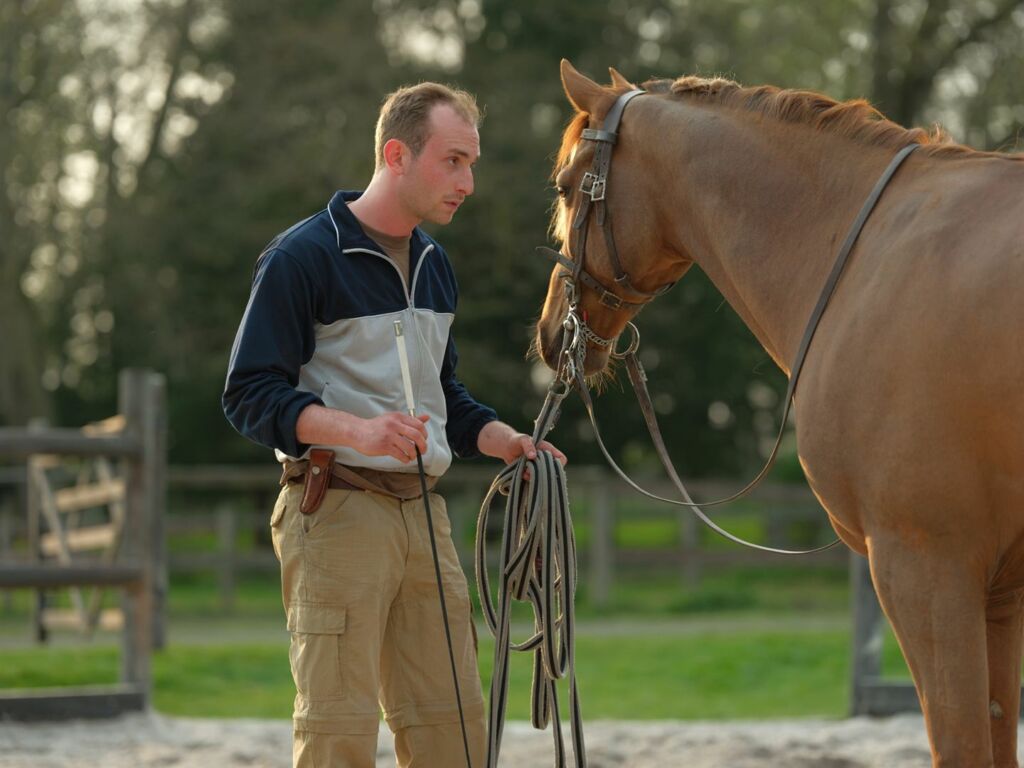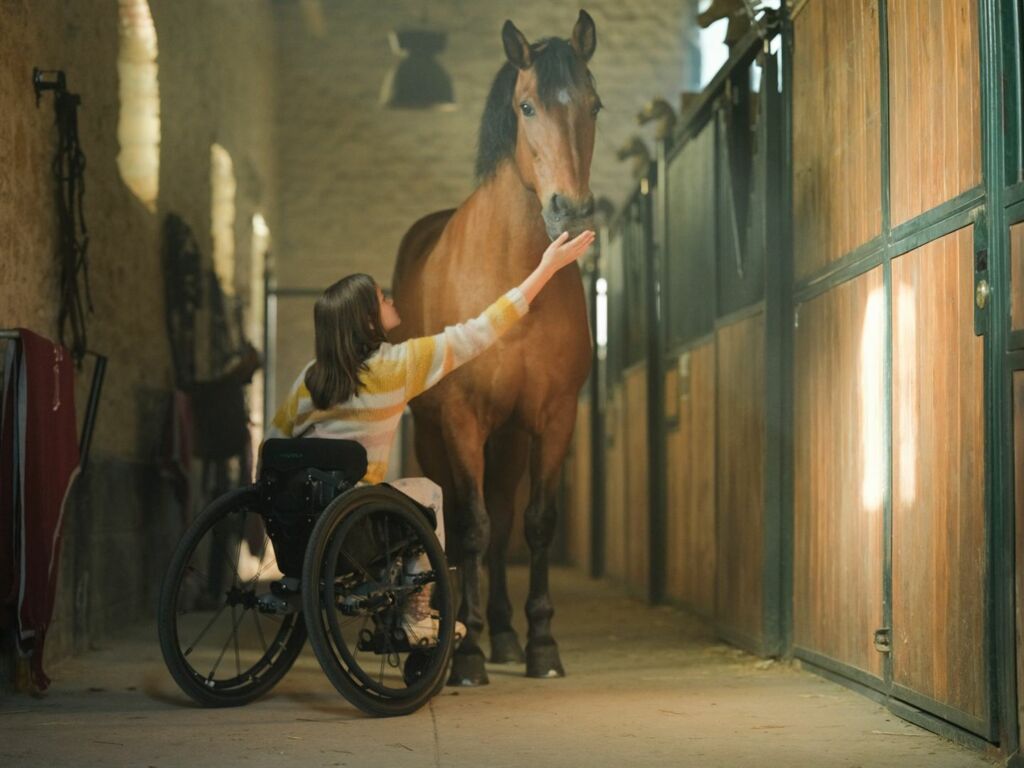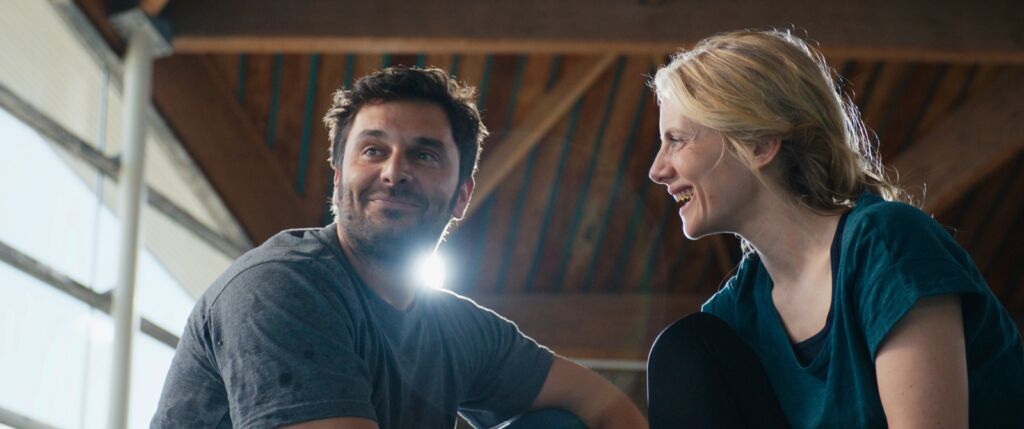Five years after his last feature film, Un Sac de Marbles (2017), Christian Duguay is back this Wednesday, December 21 to present Tempête. On the occasion of the release of the feature film worn by Mélanie Laurent and Pio Marmaï, L’Eclaireur met the director to talk about the film, but also about his cinematographic references.
Adaptation of the novel written by Chris Donner, Storm tells the story of Zoé, passionate about horses, who grew up in her parents’ Normandy stud farm. The young girl has only one dream: to become a jockey, like her father. Only, one stormy evening, his mare, Storm, panicked, knocks Zoe down, making her paraplegic. This misfortune, the little girl will finally make it a strength in order to reconnect with her destiny. With this story, Christian Duguay creates a strong drama, full of resilience, carried by an unprecedented film duo, Pio Marmai and Melanie Laurent.
The Quebec director to whom we owe Jappeloup (2013) also directed a trio of actresses made up of June Benard, Charlie Paulet and Carmen Kassovitz to take turns lending their features to Zoé. Stormit is also a movie on the world of horses, their breeding, races. A multiple project to which the director is particularly attached, and on which he returned to The Pathfinderrevealing at the same time his references as a cinephile.
What made you want to adapt the novel to the cinema?
It was producers Maxime Delauney and Romain Rousseau who approached me with Chris Donner’s book. They had seen in Jappeloup that I had approached the man/horse relationship with great sensitivity. On the other hand, with Storm, I wanted to do something different. First, of course, on the relationship with the horse, but it is also a way of dealing with resilience and disability. It is moreover by seeing Out of Standards (2019) by Olivier Nakache and Éric Tolédano, which talks about autism, that I had the idea of building the character of Sébastien (Kacey Mottet Klein) and talking about equitherapy.

There is a form of sensitivity with this character. I wanted to put it in the center as a vector to bring you closer to this spirituality between man and horse. From all of these observations, I thought to myself that I had a narrative backbone. All this allowed me to build a universe around racing, breeding, sport, dreams, but also broken dreams. There is a recipe here to take viewers on a journey through a popular, deep, out-of-the-ordinary film. I am proud of Stormbecause we checked several boxes.
The race also forms an important part of the history of Storm.
I must admit that I did not know this world at all. I therefore informed myself, and it was through contact with different people, particularly in the stud farms in Normandy, that I saw the way in which the horse is at the center of their universe, how respect for the animal is in their genetic. For the races, as we tend to stigmatize them, I wanted to show that the horses are athletes, that we don’t push them and that they work in tandem with the runners. It is ultimately a special link. I wanted to highlight the love for this animal, the organic link between man and horse.
Besides, what challenges did the racing scenes present?
For me, I must admit that I’m used to it. After 20 years of experience, I knew how to pose my camera, then the techniques are more and more advanced. I used the steadycam among the horses. I had to familiarize myself with a quad and a steadycam. Once they got used to my presence, I was able to infiltrate the platoons to make striking plans. After that, we have the sound work, hence the interest of seeing the film on a big screen. You have to experience that in the cinema, because there is a powerful immersive side. People have to move, it’s three years of work in which I invested myself!
It’s a film that fits into the continuity of your filmography in the sense that it shows broken characters. Why are you so interested in resilience?
Resilience is a big theme in my filmography, but above all in Storm, because it is also a reflection of my journey. Moreover, we are collectively coming out of a period, with the global pandemic, during which we suffered, and it is through resilience that the Earth is in the process of getting out of it. In a way too, we can see in Normandy a land of resilience, because it has faced strong things, the Second World War, the D-Day… This is also one of the reasons why we based the history in this region, apart from the fact that it is also the land where the greatest trotters in the world come from.
I didn’t exactly have a casting in mind at the start, especially for the couple, but by dint of writing and talking about it, it became natural to choose Pio and Mélanie, because together they embody an earthy side. Carmen Kassovitz, it’s because her father, Mathieu Kassovitz, was first approached for the role. So that’s how I met her. She is a very good actress and a very good rider who loved Jappeloup. I could only choose her.

On the other hand, I also had to find the girl who was going to play Zoé at the age of 12, which is the most complex part of the role in the film. She carries it on her shoulders. It was an exhaustive casting with more than 800 actresses. In the end, we chose Charlie Paulet and from the moment we found her, we were able to transpose what was in Charlie in Zoé: this way of incarnating anger, of holding back tears, this inner strength , but at the same time this way of resenting the whole world… I’m always in search of authenticity. I seek emulation in my actors.
Speaking of actors, what have been your most significant collaborations in your career?
I was very lucky. I had the chance to work with great actors, like Donald Sutherland, with whom I made seven films, or even Shirley MacLane. I am also thinking of Guillaume Canet for Jappeloup, but also now to Pio Marmaï and Mélanie Laurent. I love actors, I like to be in contact with them and vice versa, because I think they see my passion. My passion for cinema goes through this transmission with the actors.
What movies made you want to make movies?
Films that grabbed me right away, like those by the Italians Visconti or Fellini. I also think of Amadeus (1984). I was struck by his interpretation of Mozart, his direction and the virtuosity of Milos Forman. Flight over a cuckoo’s nest (1975) too, of course. After that, I like the cinema of Martin Scorsese. His vision speaks to me and I think of his work when we talk about cinema and adventure. That’s why I like making biopics, like Human Trafficking (2005), Coco Chanel (2008) or Anna Karenina (2013). I like to talk about the experiences of extraordinary people, because, once again, I am always in search of authenticity.
What are the films that have marked you recently at the cinema?
I have to quote Out of Standards (2019). This film touched my heart. This is how I thought Storm, from a disability perspective. Nakache and Tolédano are two directors who know how to go as close as possible, it’s always right, it’s always authentic and well balanced. After that there is Le Mans 66 (2019) by James Mangold, which is very well done. They are two characters so well embodied by Christian Bale and Matt Damon, they are giants. It’s based on two characters, but the film is attached to people, to passion, to friendship, to respect. These are themes that speak to me.
Christian Duguay (“Storm”): “I am always in search of authenticity”

